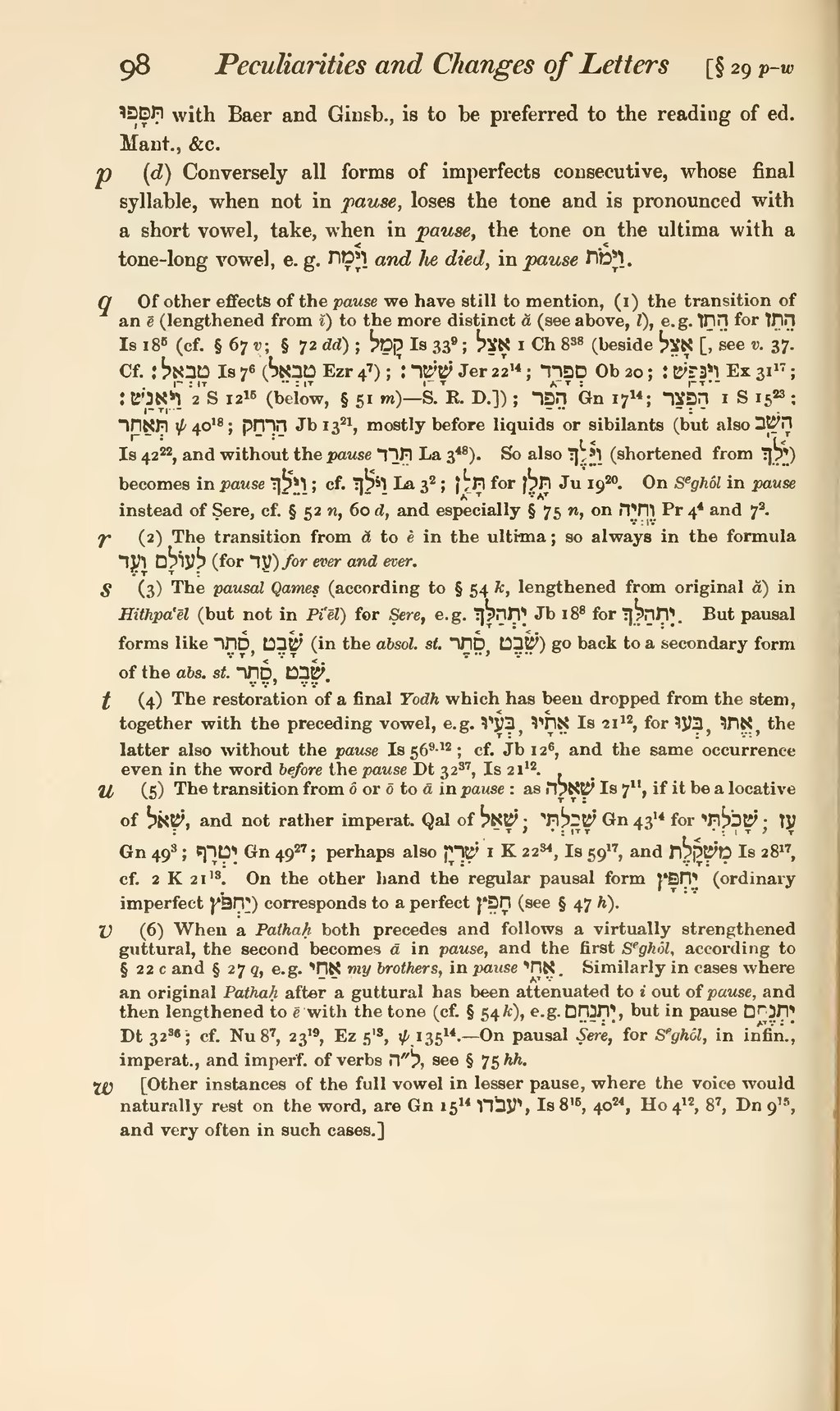תִּסָּפֽוּ with Baer and Ginsb., is to be preferred to the reading of ed. Mant., &c.
[p] (d) Conversely all forms of imperfects consecutive, whose final syllable, when not in pause, loses the tone and is pronounced with a short vowel, take, when in pause, the tone on the ultima with a tone-long vowel, e.g. וַיָּ֫מָת and he died, in pause וַיָּמֹ֫ת.
[q] Of other effects of the pause we have still to mention, (1) the transition of an ē (lengthened from ĭ) to the more distinct ă (see above, l), e.g. הֵתַז for הֵתֵז Is 18 (cf. § 67 v; § 72 dd); קָמַל Is 33; אָצַל 1 Ch 8 (beside אָצֵל [, see v. 37. Cf. טָֽבְאַֽל׃ Is 7 (טָֽבְאֵל Ezr 4); שָׁשַֽׁר׃ Jer 22; סְפָרַ֑ר Ob 201; וַיִּנָּפַֽשׁ׃ Ex 31; וַיֵּֽאָנַֽשׁ׃ 2 S 12 (below, § 51 m)—S. R. D.]); הֵפַר Gn 17; הַפְצַר 1 S 15; תְּאַחַֽר ψ 40; הַרְחַק Jb 13, mostly before liquids or sibilants (but also הָשַֽׁב Is 42, and without the pause תֵּרַד La 3). So also וַיֵּ֫לֶךְ (shortened from יֵ֫לֵךְ) becomes in pause וַיֵּלַ֫ךְ; cf. וַיּׄלַ֫ךְ La 3; תָּלַ֑ן for תָּ֑לֶן Ju 19. On Seghôl in pause instead of Ṣere, el. § 52 n, 60 d, and especially § 75 n, on וֶהָֽיֶה Pr 4 and 7.
[r] (2) The transition from ă to è in the ultima; so always in the formula לְעוֹלָם וָעֶד (for עַד) for ever and ever.
[s] (3) The pausal Qameṣ (according to § 54 k, lengthened from original ă) in Hithpaʿēl (but not in Piʿĕl) for Ṣere, e.g. יִתְהַלָּךְ Jb 18 for יִתְּהַלֵּךְ. But pausal forms like סָ֫תֶר, שָׁ֫בֶט (in the absol. st. סֵ֫תֶר, שֵׁ֫בֶט) go back to a secondary form of the abs. st. סֵ֫תֶר, שֵׁ֫בֶט.
[t] (4) The restoration of a final Yodh which has been dropped from the stem, together with the preceding vowel, e.g. בְּעָ֫יוּ, אֵתָ֫יוּ Is 21, for בְּעוּ, אֱתוּ, the latter also without the pause Is 56; cf. Jb 12, and the same occurrence even in the word before the pause Dt 32, Is 21.
[u] (5) The transition from ô or ō to ā in pause: as שְׁאָלָה Is 7, if it be a locative of שְׁאֹל, and not rather imperat. Qal of שָׁאַל; שָׁכָֽלְתִּי Gn 43 for שָׁכֹֽלְתִּי; עָז Gn 49; יִטְרָף Gn 49; perhaps also שִׁרְיָן 1 K 22, Is 59, and מִשְׁקָ֫לֶת Is 28, cf. 2 K 21. On the other hand the regular pausal form יֶחְפָּץ (ordinary imperfect יַחְפֹּץ) corresponds to a perfect חָפֵץ (see § 47 h).
[v] (6) When a Pathaḥ both precedes and follows a virtually strengthened guttural, the second becomes ā in pause, and the first Seghôl, according to § 22 c and § 27 q, e.g. אַחַי my brothers, in pause אֶחָ֑י. Similarly in cases where an original Pathaḥ after a guttural has been attenuated to i out of pause, and then lengthened to ē with the tone (cf. § 54 k), e.g. יִתְנַחֵם, but in pause יִתְנֶחָ֑ם Dt 32; cf. Nu 8, 23, Ez 5, ψ 135.—On pausal Ṣere, for Seghôl, in infin., imperat., and imperf. of verbs ל״ה, see § 75 hh.
[w] [Other instances of the full vowel in lesser pause, where the voice would naturally rest on the word, are Gn 15 יעבֹדו, Is 8, 40, Ho 4, 8, Dn 9, and very often in such cases.]

